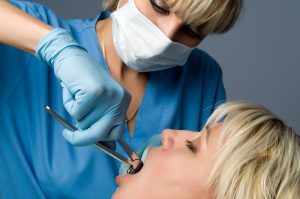Despite our best efforts, sometimes our teeth suffer irreversible damage or decay. In these events, a tooth that’s diseased or causing an issue affecting other teeth has no reason to remain in our mouth. While an extraction is never the highlight of someone’s day, it is sometimes necessary to restore and maintain our overall oral health. Keep reading to learn about teeth extractions , and what you can expect during and after the procedure.
Why You May Need a Tooth Extracted
- Damage – Although dental decay has many treatment options, if the damage becomes too extensive and renders the tooth useless, a dentist may opt for extraction. This is also the case if a tooth is considered unsalvageable following trauma. Some examples include critically cracked or broken teeth.
- Impaction or overcrowding – Impaction occurs when teeth grow or shift into the wrong position. If they are too large to fit comfortably and cause other teeth to shift to accommodate them, it is called overcrowding. In the event that this prevents other teeth from erupting, they will be extracted to create more space. One or both of these situations commonly occur as wisdom teeth begin to erupt, which is why they are typically extracted.
- Infection – Tooth decay left untreated, or caught to late, may result in extraction. In most cases, a root canal is the preferred treatment method. However, if an infected tooth risks the integrity of surrounding teeth, a dentist may choose to extract it. This is often the case if an infection has reached the pulp of a tooth. A person’s chance of requiring an extraction due to infection can also significantly increase due to other conditions. Chemotherapy in particular, can decrease the effectiveness of a person’s immune system, rendering them less able to fight oral infection and disease.
What to Tell the Dentist
As with any surgery, you should disclose any underlying health conditions to your dentist or oral surgeon. These are vital, especially if you have an increased risk of infection, are prone to blood clots or take blood thinners. Your dentist will then be able to adequately prepare you, or take preventive action, such as prescribing antibiotics. Some information you should disclose includes:
- History of disease
- Impaired immune system
- Congenital heart defect
- Liver disease
- An artificial joint
- History of bacterial endocarditis
- Any medication or supplements you take
What to Expect
 Similar to any procedure,
tooth extraction can be daunting
. However, patients can take comfort knowing that the procedure is regularly performed. To start, your dentist or oral surgeon will inject a local anesthetic to numb the area. Some may use a general anesthetic, or you may be able to request it. This will ensure that you feel no pain during the procedure ‒ at most, a tugging sensation.
Similar to any procedure,
tooth extraction can be daunting
. However, patients can take comfort knowing that the procedure is regularly performed. To start, your dentist or oral surgeon will inject a local anesthetic to numb the area. Some may use a general anesthetic, or you may be able to request it. This will ensure that you feel no pain during the procedure ‒ at most, a tugging sensation.
Depending on the reason for extraction, the tooth will need to be accessed in various ways. If it is impacted, the gums and tissue will be cut away so that it can be pulled with forceps. In rare instances, the tooth may need to be cut out in segments. Once the tooth is removed, blood will immediately begin to clot. The dentist or surgeon will assist this process by applying gauze and light pressure. If necessary, they may utilize self-dissolving stitches to pull the gums over the edges of the extraction site. Once you are coherent, you will be allowed to leave the dental office.
After a Tooth Extraction
When you arrive home, chances are you will be groggy, and want to take a nap. Twenty-four hours of relaxation will make you feel better, but your recovery time will increase if you follow your dentist’s post-procedure recommendations .
- First, be sure to take your painkillers or antibiotics as prescribed. This will decrease your discomfort, and help prevent any dangerous infections.
- You will be sent home with gauze over the removal site; make sure to change it before it is soaked. Keep light pressure over the socket using your teeth. Your dentist will likely warn you about dry socket – when the blood clot in the socket breaks loose, exposing the bone in the socket. If this occurs, see your dentist as soon as possible.
- Your dentist will recommend you rinse with a saline solution regularly, once 24 hours have passed following the procedure. It is made of 1/2 teaspoon salt and 8 ounces of warm water. This will help prevent infection and soothe the site.
- If your mouth or jaw feel sore, apply ice and heat in 15 minute intervals to relieve swelling and discomfort.
- Eat soft foods or soup. You will gradually be able to reintroduce firmer foods, but allow two to three days before doing so.
- Avoid spitting forcefully, brushing the extraction site or drinking with a straw. Any of these could dislodge the clot in the socket, allowing infection or inhibiting healing.
At 24/7 Local Dentist , we utilize the highest quality restorative materials available, and perform advanced procedures through minimally invasive techniques. Dr. Khan ’s goal is to enhance the lives and smiles of her patients by helping them achieve optimal oral health. Contact us today with any questions, or to schedule an appointment.










